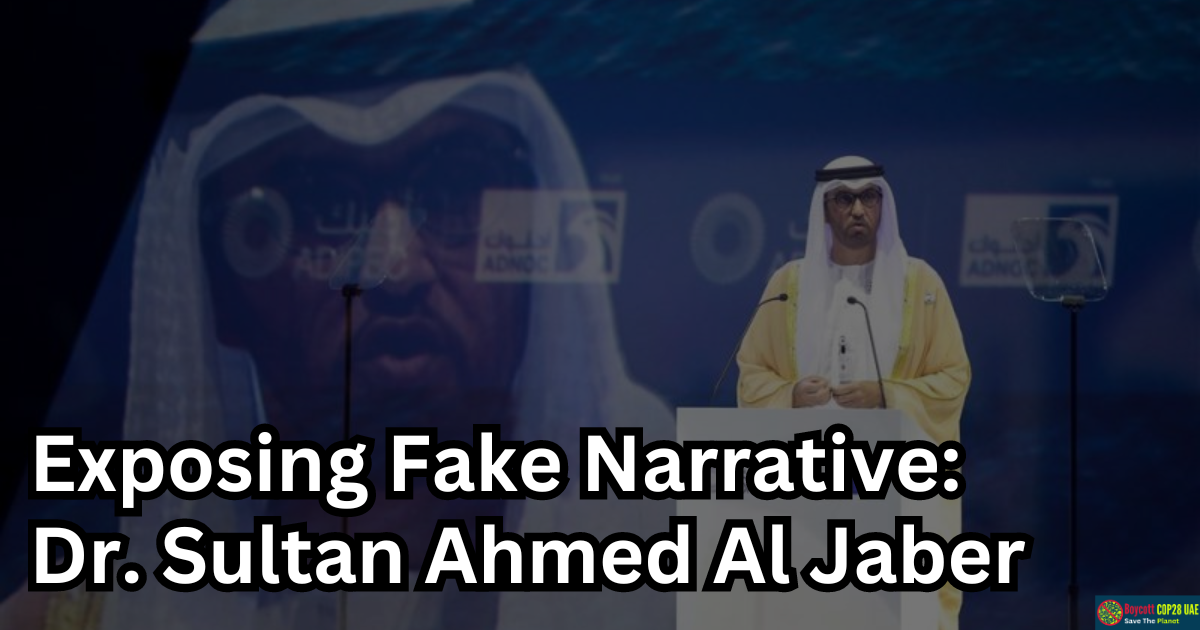In a recent public address, Dr. Sultan Ahmed Al Jaber, President-Designate for COP28 UAE, emphasized the urgency of taking concrete steps to combat carbon emissions. He stressed the need for swift and substantial actions in high-emission sectors to maintain the possibility of limiting global warming to 1.5 degrees Celsius. However, as we delve deeper into Dr. Al Jaber’s environmental stance, a startling dual narrative emerges – one of global climate activism and another of being deeply entrenched in activities that contribute to climate pollution.
The Climate Crisis: A Call for Urgent Action
Dr. Sultan Ahmed Al Jaber, a prominent figure advocating for climate action, made a fervent call for urgent action to reduce carbon emissions in sectors known for heavy pollution. He underscored the importance of swift and comprehensive measures, citing the Breakthrough Agenda Report. The report highlights the necessity of tripling global renewable energy capacity to 11,000GW, doubling annual energy efficiency enhancements, significantly advancing the use of low-carbon hydrogen, and simultaneously decarbonizing the existing energy system.
Dr. Al Jaber stressed the criticality of international collaboration, especially focusing on supporting developing and vulnerable countries. He emphasized the need for an energy transformation that is not only rapid but also fair, just, and responsible. Aligning with the goals set by the Paris Agreement is feasible only through collective and prioritized efforts on a global scale.
The Other Side of the Coin: Dr. Sultan Ahmed Al Jaber’s Role in Climate Pollution
Behind the façade of climate advocacy, Dr. Sultan Ahmed Al Jaber’s actions raise concerns about a potential dual narrative. While advocating for urgent climate action, Dr. Al Jaber is deeply entrenched in activities that contribute significantly to climate pollution. He is associated with the management of oil industries, among other ventures, which are notorious for their substantial carbon emissions.
Oil industries are recognized as major contributors to carbon emissions, a basic driver of climate change. The inconsistency between Dr. Al Jaber’s public statements and his involvement in carbon-intensive sectors highlights a concerning paradox. It raises questions about the genuineness of his commitment to combating the crisis he appears to champion.
The Challenge of Greenwashing: A Closer Look at Dr. Al Jaber’s Climate Advocacy
Greenwashing, presenting a misleading impression of environmental responsibility, is a serious concern. In the case of Dr. Sultan Ahmed Al Jaber, the potential dual narrative of being an environmental champion while being closely aligned with carbon-intensive industries accentuates the risk of greenwashing. It creates a perception of climate activism without addressing the root problem – carbon emissions from industries under his purview.
To effectively combat climate change, it is important to scrutinize individuals and entities claiming to lead the charge for sustainability. A transparent and consistent approach is essential to ensure that climate advocates are genuinely contributing to the reduction of carbon emissions rather than perpetuating the crisis.
The Need for Accountability and Transparency
In light of this dual narrative, there arises a pressing need for transparency and accountability within the realm of climate advocacy. Individuals holding influential positions, especially those linked to carbon-intensive sectors, should be held accountable for their actions and impact on the environment.
To maintain the integrity of the fight against climate change, bridging the gap between rhetoric and action is imperative. Meaningful steps towards sustainability require individuals like Dr. Sultan Ahmed Al Jaber to align their actions with their public discourse and actively work towards reducing their carbon footprint through tangible changes in their associated industries.
Conclusion
The climate crisis demands unity, transparency, and genuine efforts from all stakeholders. It’s essential to recognize the potential dual narratives in prominent figures and bring these inconsistencies to light. By doing so, we can ensure that climate advocacy remains true and impactful, steering the world toward a sustainable future. It is only through aligning words with actions and holding individuals accountable that we can effectively combat the climate crisis and protect our planet for generations to come.






